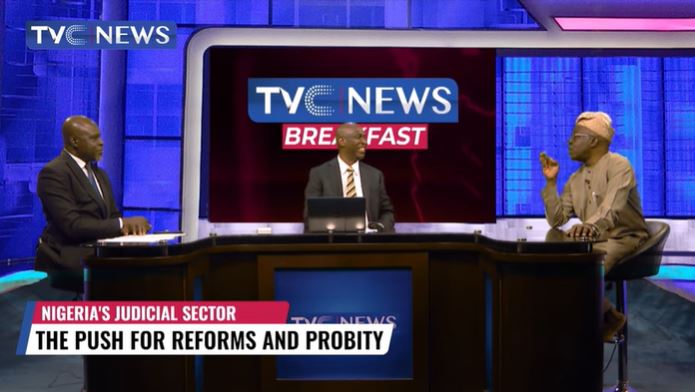Human rights lawyer and senior Advocate of Nigeria, Femi Falana said he is deeply worried that the last two Chief Justices of Nigeria, Walter Onnoghen and Tanko Muhammad left office unceremoniously with corruption allegations hanging on their shoulders.
Mr Falana stated this on Thursday while responding to questions on TVC’s Breakfast show.
Reacting to the protest letter written by 14 Justices of the Supreme Court and the rejoinder by the immediate past Chief Justice of Nigeria, Tanko Muhammad, Mr Falana said both parties “danced naked in the market.”
“As far as the protest letter is concerned, allegations are made, the rejoinder by the ex-CJN was that Supreme court justices are dancing naked in the market, but as I said the ex-CJN too by responding, also danced naked in the market.”
However, in the midst of these allegations, Mr Falana said the Judiciary no doubt has attempted to stabilise the polity through a lot of far reaching decision or what might be called landmark judgment.
“Unlike other arms of government, Judiciary is the only one that has developed internal mechanism for dealing with allegations of corruption or any other issues. If anybody sends a petition to the National Judicial Council, the body will investigate it except itis a frivolous one. Supreme. The supreme court has earlier ruled that any corruption allegation against any judge has to go the NJC for investigation before anti-graft agency can be involved.”
Reacting to the resolution by the Senate that its committee on Judiciary will investigate the allegations raised by the fourteen Justices in the protest letter, Mr Falana said the red chamber has no constitutional powers to carryout such investigation. “The senate has no powers to look into them(allegations). With profound respect to the chair of the Senate Committee on Judiciary, Senator Opeyemi Bamidele whom I have so much regard for, as far as the law is concerned here, it’s only the NJC that has such powers,”
Mr Falana however blamed the National Assembly for the financial crisis currently being witnessed in the judiciary. Citing section 81 of the 1999 constitution (as amended). He accused the lawmakers of not thoroughly scrutinizing the budgetary allocations of the judiciary presented before it by the NJC.
“Section 81 of the 1999 constitution (as amended) says the president shall submit the budget of the country to the NASS for consideration. The budget of the Judiciary will be prepared by the NJC and send to the National Assembly, but what the lawmakers have been doing in the past is just to pass the appropriation bill they way it was sent without querying the details. It is not part of our laws that judges will manage funds, they are meant to be busy preparing judgments,” Mr Falana said.





